Healthy, juicy Raspberry plant starts with great soil they have to grow. Raspberry plants thrive well in drained sandy or loamy soil enriched with organic matter a few weeks before planting. The Raspberry adapts to a wide range of soil types. They grow best in well-drained, fertile lands. Raspberry grows badly in heavy soil or poorly drained soil. You can often improve poor soil by adding well-rotted barnyard manure or compost.
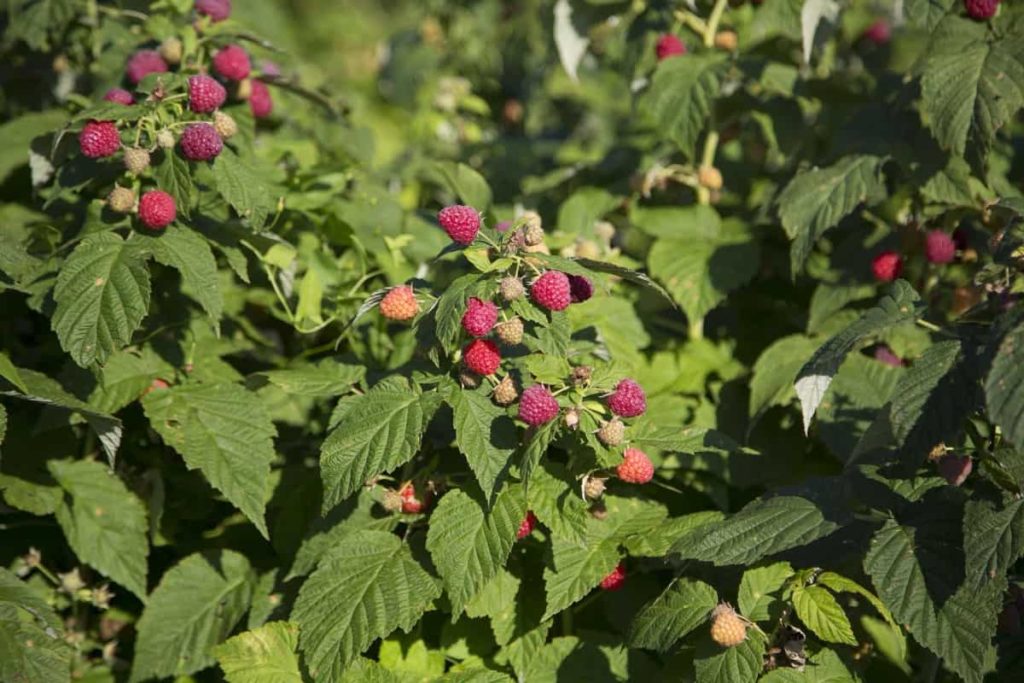
Planting in raised beds can improve drainage. When choosing a plantation site, select an area that receives the full sun. The plantation site should get at least 6 hours of direct sunlight daily. Avoid shady areas near large trees and shrubs. Also, avoid areas that are heavily affected by perennial weeds. Perennial weeds, such as couch grass, are tough to control in planting Raspberry.
How to prepare the soil for Raspberry plants/trees
Soil pH for Raspberries
Raspberry plants require acidic soil to thrive. Raspberry plants like a soil pH of 5.5 to 6.5. Acidic soil is good for those that provide nutrients in the soil. However, these plants do not perform well in highly acidic soils. Raspberry plants will grow healthy if soil pH levels are at their preferred level. Raspberry plants prefer soil to become slightly acidic.
However, you must be careful that these plants do not like extraordinarily acidic or more alkaline soil. Treat soils that are very acidic with lime and soil that are too alkaline with sulfur. Treat soil a year before planting, just as you modify the soil with manure or compost.
In case you missed it: Best Fertilizer for Raspberry Plants: Homemade, Natural, Organic, Compost, and Schedule
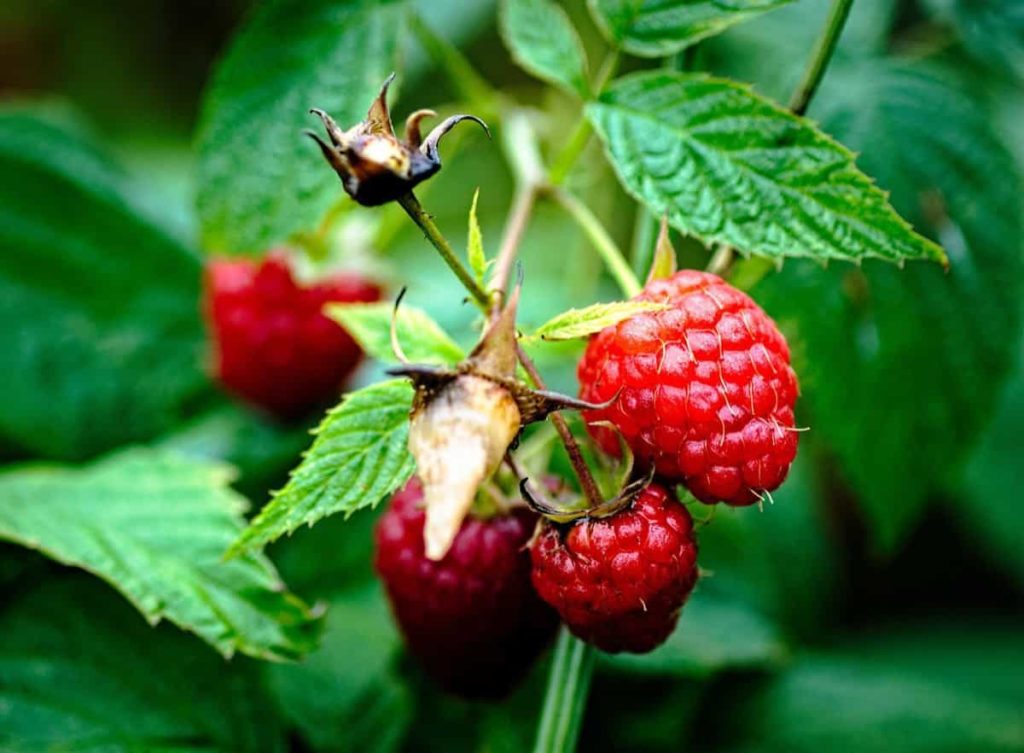
Preparation of soil for growing Raspberries in pots
Raspberries in pots require a little acidic, nutrient-sustaining, well-draining soil. Any bagged potting soil will work well for these container plants, although it is important to amend the potting soil with compost, aged manure, or peat moss. Compost and manure also provide essential nutrition and help in maintaining moisture.
Potting mix with aged manure, compost, peat moss, perlite, and humus will work wonders for tremendous growth. If you have heavy soil, add sand, aged manure, perlite, and peat moss to modify or buy a commercial. Use potting mix, not garden soil, to grow Raspberry in a pot. Because you’re likely going to eat Raspberry, use an organic fertilizer. Apply fertilizer immediately after planting in spring.
Preparation of soil for growing Raspberries on grounds
The Raspberry will grow well in most soil varieties except for very compacted or light chalky soil. They grow and produce the best fruits in organic matter-rich moist, well-drained soil. They like good water supply, especially when the fruits are produced in the summer. If drainage is problematic, plant juicy bushes on raised beds or mounds. Removing perennial weeds in a garden bed is crucial before planting the Raspberry because once the Raspberry is planted, you cannot use the system of herbicides without the risk of injuring plants.
How to grow Raspberries in poor soil
Raspberries grow badly in heavy clay or poorly drained soil. You can often improve poor soil by adding well-rotted barnyard manure or compost. Raspberries cannot tolerate poorly drained soil. If the soil of the crop is wet, you will never achieve the maximum yield, even for a short period. Actively growing roots will start to suffocate and die within 24 hours of being submerged. In addition, wet conditions favor the occurrence of soil-related diseases. Raspberry is sensitive to Phytophthora root rot.
Many gardens have easy-to-build raised beds due to roots or poor soil. Ideally, the bed’s loose soil should be 24 inches deep. The berries require at least 6 to 8 inches. Avoid filling the bed with just the normal garden or the topsoil, as the surface will be crisp, and the bed will dry quickly. If the soil is too wet for a long time, the roots cannot absorb iron from the soil, and iron deficiency causes the leaves to turn yellow. Iron chlorosis is a common problem in Raspberry, especially in plants grown in clay soil.
In case you missed it: How To Start Raspberry Gardening, Tips, Techniques
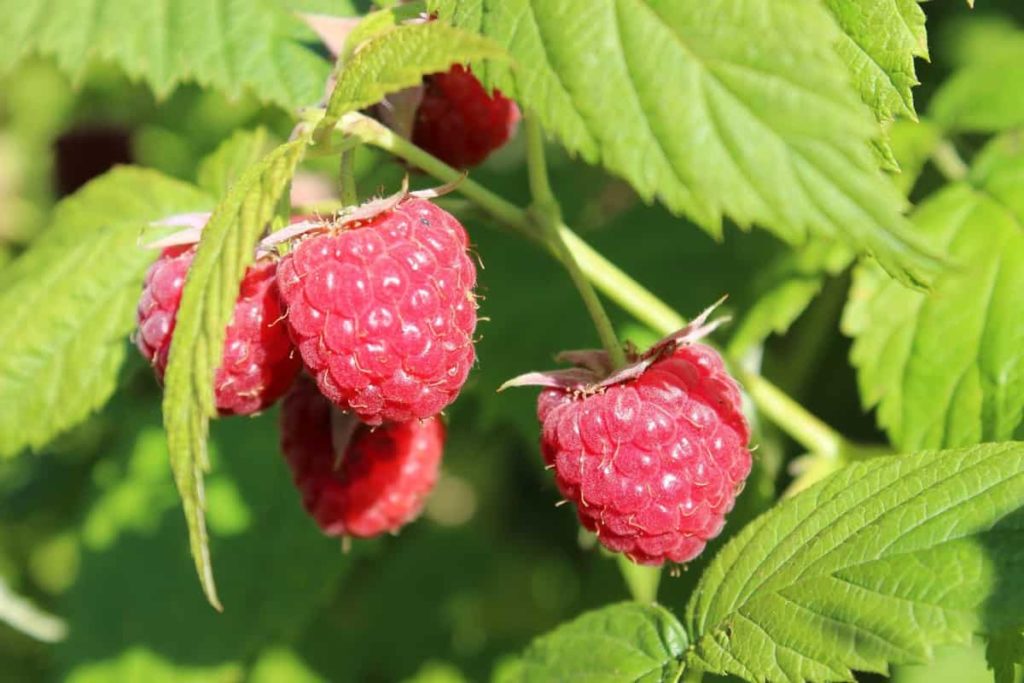
Soil composting for Raspberries
The Raspberry plants thrive best in well-drained and fertile soil. You can improve drainage and soil fertility by adding compost or manure to your soil the year before planting. Spread organic matter evenly to the area where you plan to plant your Raspberry, and then reapply a few times during the growing season. Grow organic Raspberries at home in a well-drained area in your garden. Add organic, aged cow manure and fertilizer to the soil before planting to fertilize the growing plant. Plant Raspberry in a sunny place in the fall in spring in light climate or cold areas.
Land preparation for Raspberries
Ideally, prepare by ensuring your soil is right in summer or autumn before planting. Your first task is to ensure that all weeds are removed. Paying attention to the detail before planting will save a lot of work later. You can dig up deep-rooted weeds like Dandelions, Thistle, and Nettles with less harmful annually. You might prefer to use a good herbicide for a large area, saving a lot of time. Before planting your new Raspberry canes, allow 4 to 6 weeks after application.
Raspberry has quite shallow roots, so you need to be very careful between them, which is why it is twice as important to ensure the required area is as clean as ever. Then dig a trench of about 15 inches in depth and 36 inches in width to prepare the plantation area. That would be enough for a row of Raspberry. Form a layer of good humus-rich manure under the trench – it can be a mixture of leaf molds, compost bin, grass clippings, a little well-rotten manure, or proprietary compost.
Fork it well and backfill from your removed soil. You can rake in a little fertilizer bonemeal are good. It doesn’t matter if the soil is now a little higher than the surrounding land as it will settle down. It is better to plant in which to plant than to have a submerged trench. You can repeat this process based on how many rows you plan to make.
Raspberry canes spread as they grow, and you need room to move between rows to perform basic tasks such as pruning and harvesting. It will soon be clear that the Raspberry can need more space than any other soft fruit, BlackBerry probably aside. But this place is repaid with a useful life of 15 to 20 years on rich long-season crops and good soil.
In case you missed it: Growing Raspberries Indoors in Pots (Containers)
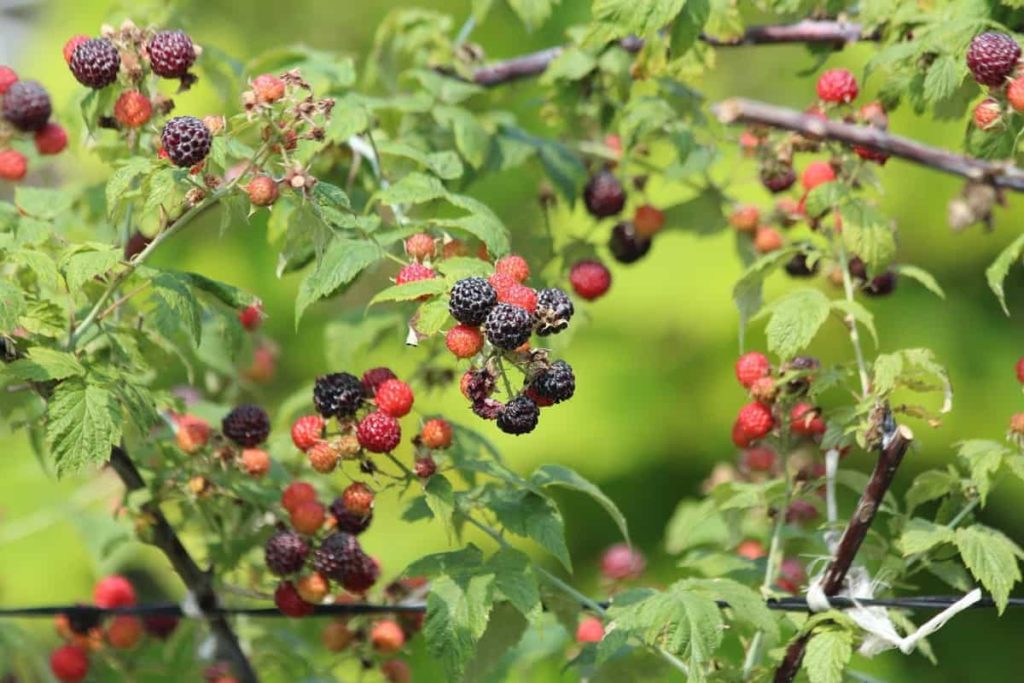
Best soil mix for Raspberries
If you are growing Raspberry plants in containers, a growing medium comprises a portion of perlite, one part of the ground’s bark, and two parts of potting soil. The pumice can be used as an alternative to the perlite. In this case, you would like to choose large containers to accommodate the Raspberry plants and have holes that allow for proper drainage.
Natural soil amendments for Raspberries
Raspberries need a wide range of nutrients to grow healthy. Prepare the soil a few weeks before planting your Raspberry with aged cow manure and a handful of organic pelleted chicken manure. You can add organic compost, bought or homemade, to help keep moisture in the soil and include additional nutrients available to the plant over time.
Add compost or cow manure to the top of the soil around the root base of plants in spring every year, and your plant will grow well without adding any other fertilizer. Raspberries love moist soil, so adding a good layer of mulch after planting is essential. Use a light mulch like Sugarcane or Straw mulch that will break down and add extra nutrients to the soil in a few months while keeping the weeds away.
Raspberry doesn’t like to compete with weeds, so make sure you remove all the weeds before you plant them. Make sure to remove any weed with runners like couch grass, as it will be very difficult to remove after you plant the Raspberry. Adding a single layer of mulch around the Raspberry plants is key to keeping 2 to 3 inches thick weeds away organically.
What to do with soil when growing Raspberries
Legumes are the best companion plants as they provide the Raspberry plant with extra nutrients containing bacteria on their root nodules. They help by fixing environmental nitrogen. Furthermore, they also act as a natural mulch cover crop to prevent soil erosion and maintain moisture. Some legume crops best used with Raspberries are Beans, Soybeans, Peanuts, Chickpeas, Lentils, etc.
Onions and garlic belong to the same Allium family. The strong sulfur smell of Onions and Garlic prevents insects like aphids and beetles. Planting them near Raspberry can also prevent fungal infections due to their antifungal and antibacterial properties. They are better planted in the fall near the time of harvesting of the Raspberry fruits. It makes the best use of both Onions and Garlic by preventing Raspberry fruit disease and pests and increasing fruit production.
In case you missed it: Growing Raspberries Hydroponically – a Full Guide
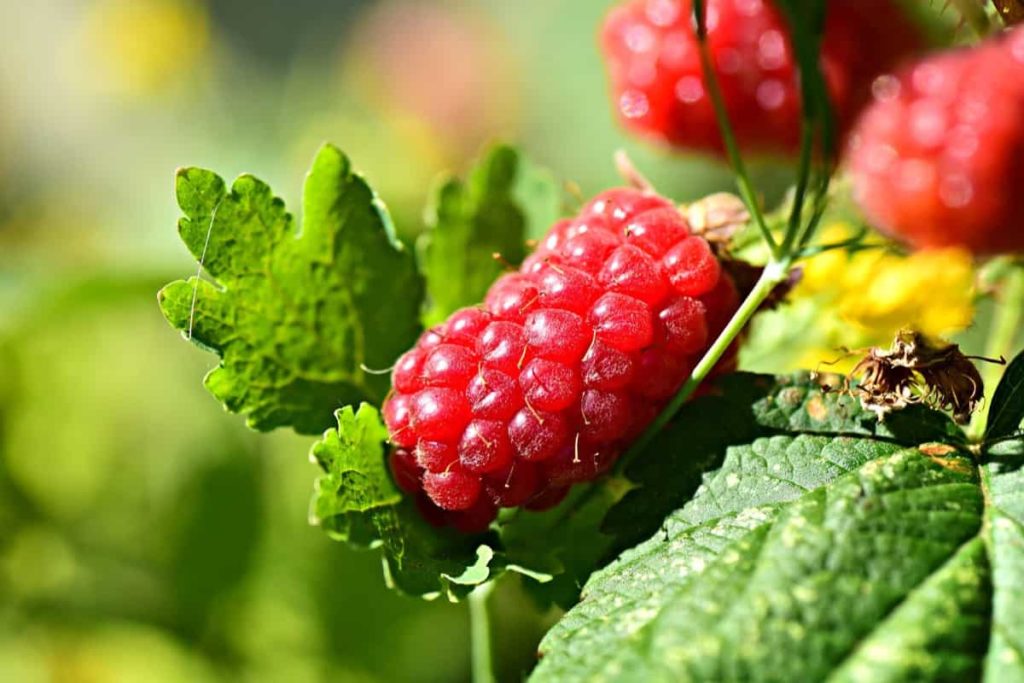
Marigold flowers add an attractive color to the garden. This flower attracts beneficial pollinated insects like butterflies and bees that help in the growth of pollinated and fruit development. Furthermore, Marigold produces a special chemical that repels and kills nematodes and worms from the soil. These insects can obstruct the Raspberry and sometimes even kill the plant. Therefore, planting Marigolds and Raspberries can help keep the plant healthy and increase production.
The Chervil grows well in the shadow of the Raspberry plant under its bush. The strong aroma of the Chervil repels the slugs and aphids, making it a good companion plant for the Raspberry. Chives are the same family as Onions and Garlic and produce a strong aroma that can repel different insects. Usually, Chives repel insects such as Japanese beetles and aphids. Chamomile also produces beautiful flowers with a strong fragrance.
This strong smell prevents harmful insects and attracts the beneficial. Chamomile flowers attract bees and butterflies. It helps in increasing the number of berries produced by the Raspberry. This flowering plant’s antifungal and antibacterial properties are extremely beneficial for Raspberry to keep them healthy. Aphids and Japanese beetles do not like the Mint smell. So, planting Mint with the Raspberry can protect it from these insects and keep it healthy.
Insects like squash bugs don’t like the smell of Nasturtium flower. Because of this, they rarely enter the field with these flowers. Nasturtium plant attracts the aphids. So, planting a few Nasturtiums in the garden helps attract the aphids to the Nasturtium while keeping your Raspberry pest free. Thyme produces aromatic oils responsible for activating helpful chemicals like anthocyanin in Rasberry. Turnip also produces a strong smell that insects like harlequin beetles and aphids don’t like.
Worst plants to grow with a Raspberries
Several plants have harmful effects when grown with the Raspberry plant. Various facts are responsible for these plants’ harmful growth together with the Raspberry plants. Potatoes, Eggplant, and Tomatoes are heavily affected by fungal diseases like blight. These plants near your Raspberry can also transfer the infection to the Raspberry. Blight can greatly affect the growth of the Raspberry, sometimes causing death.
In case you missed it: How to Prepare the Soil for Blueberry Trees: Best Soil Mix, pH, Compost, and Recipe
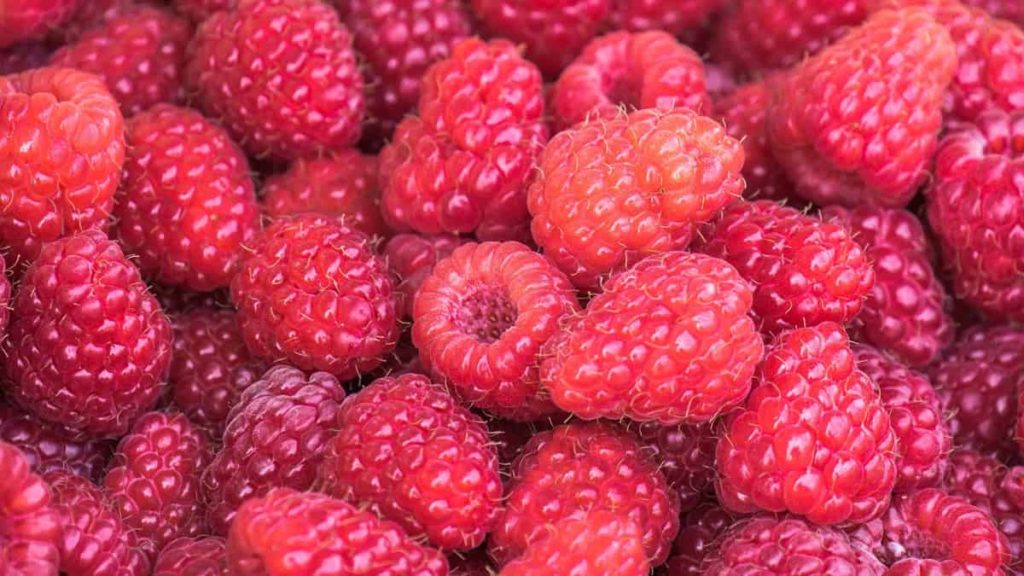
Therefore, keep these plants away from your Raspberry plant. Pepper and chilies also attract various fungi and viral diseases. Planting these and Raspberry plants can also transfer these diseases to your berry. So, keep Pepper and Chili as far as possible from the juicy bush of your garden. Fennel produces an allopathic chemical from its root, damaging the growth and development of other plants.
So, you should keep Fennel away from your Raspberries so that they keep growing healthy. Strawberry is highly susceptible to fungi disease verticillium wilt. It also attacks Raspberry alike. If not treated in time, this wilting can harm the Raspberry. So, it is better to keep Strawberries away from the Raspberry to preserve them.
Conclusion
It is easy to grow all kinds of Raspberry shrubs, from red and golden to purple and black varieties. With their rapid growth and reliable yield, Raspberries are one of the fruit crops. It is easy to grow Raspberry fruit which needs organic manure or cow manure once a year for good production. It is essential to get the right soil for your Raspberry. As long as you take these steps and monitor the Raspberry for any problem, they should be able to live long. If you prepare the soil well and keep mulch, they will produce lots of organic Raspberries for your family.
- Growing Gold: Essential Techniques for Planting Pineapples
- How to Make Kalanchoe Plant Bushy: Home Remedies and Solutions
- 11 Reasons Why Your Gardenia is Not Blooming: Home Remedies and Solutions
- Eco Elegance: The Guide to Designing a Drought-Tolerant Landscape
- Gardening on a Slope: Strategies for Hillside Landscaping
- Nourish and Flourish: Top Organic Mulches for Thriving House Plants
- Everything You Want to Know about Indian Mogra Flower: Discover Uses and Growing
- Green Thumb Success: Expert Tips for Cultivating Greenhouse Pumpkins All Year Round
- Maximize Growth & Flavor: The Ultimate Guide to Companion Planting in Herb Gardens
- How to Control Rhododendron Problems Naturally: Home Remedies and Organic Ways to Fix Them
- Natural Magic: The Remarkable Benefits of Cinnamon for Plants
- Best Steps to Revive Dying Tulip with Natural and Organic Treatment
- 10 Reasons Why Your Angel Trumpet is Not Blooming: Remedies and Treatment
- How to Fix Periwinkle Leaf and Flower-Related Problems: Natural Remedies and Solutions
- How to Fix Zinnias Leaf and Flower Problems: Discover Natural and Home Remedies
- Organic Steps to Induce Lemon Tree Flowers: A Comprehensive Guide
- Bloom Booster: Crafting the Perfect Homemade Bougainvillea Fertilizer
- Optimizing Growth: A Guide to Applying NPK Fertilizer for Potted Plants
- 10 Best Homemade Fertilizers for Rubber Plant: DIY Recipes and Application Method
- How to Boost Female Pumpkin Flowers: Effective Steps for More Flowers and High Yields
- Transform Your Indoor Garden: Top Benefits of Pink Salt for Houseplants
- 10 Best Homemade Fertilizers for Peacock Plants (Calathea): Easy DIY Guide
- Unlock Blooms: 9 Reasons Why Your Potted Chrysanthemum is Not Blooming
- 8 Reasons Why Your Potted Hibiscus is Not Blooming: Fix it with Simple Solutions
- Unlock Blooms: 9 Key Reasons Your Potted Frangipani Won’t Flower
- 10 Reasons Why Is My Ice Plant Not Blooming: Remedies and Treatment
- 10 Reasons Why My Potted Hydrangea Not Blooming: Treatment and Remedies
- 10 Reasons Why is My Wisteria Not Blooming: Remedies and Treatment
- 10 Reasons Why is My Goldfish Plant Not Blooming: Remedies and Treatment
- Maximize Your Space: Ultimate Guide to Balcony Gardening with Grow Bags
- 10 Reasons Why Your Iris is Not Blooming: Remedies and Treatment
- 10 Reasons Why Your Anthurium Plant is Not Blooming: Treatment and Remedies
- 10 Reasons Why Your Aquaponic Plants Are Not Flowering: Remedies and Treatment
- 10 Reasons Why Your Agapanthus is Not Flowering: Remedies and Treatment
- Ultimate Guide to Brown Turkey Fig: Steps to Growing Brown Turkey Figs
- How to Grow Acai Berry: Propagation, Planting, and Care